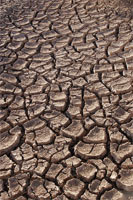Water insecurity ‘costs the global economy hundreds of billions of dollars annually’
22 Apr 2015
Research led by the University of Oxford says the 'unmanaged risks' of droughts, water scarcity and floods are dragging down the global economy by hundreds of billions of dollars annually.
 The report, Securing Water, Sustaining Growth, written by an international Task Force set up by the Global Water Partnership and the Organisation for Economic Co-operation and Development (OECD) was launched at the Seventh World Water Forum in South Korea which is being held this week.
The report, Securing Water, Sustaining Growth, written by an international Task Force set up by the Global Water Partnership and the Organisation for Economic Co-operation and Development (OECD) was launched at the Seventh World Water Forum in South Korea which is being held this week.
Claudia Sadoff, distinguished visiting scholar at the University of Oxford and Task Force chair and report co-author, said: 'Both our empirical and theoretical analyses demonstrate the importance of investment in water security for development and the importance of development for investment in water security.'
The report assesses the relative economic risks of water security, finding that South Asia has the largest global concentration of all water-related risks.
East and Southeast Asia have the greatest numbers of people exposed to the risk of floods. In terms of annual property damage, the US is shouldering the biggest economic loss with exposure to fluvial and coastal flooding costing $54billion per year (0.3 per cent of GDP).
Report co-author and co-chair of the Task Force, professor Jim Hall, commented, "The report cannot provide a fully monetised value for global water security because of the nature of water-related risks which do not lend themselves to a consistent valuation. However, we do show that the risks of water security cost the world economy in excess of hundreds of billions of dollars annually.
"Our calculations focus on estimated losses of existing assets or expected losses of current production. Yet, potential losses mean the cost to the world economy is even higher as water-related opportunities to generate growth are being missed."
The research team examined 113 countries to provide empirical evidence to guide future investments in global water security. Of these, India is ranked as the worst affected country in the world for the number of people who are exposed to inadequate supplies and sanitation, or at risk of flooding. The greatest increase in agricultural water risks are likely to be felt by Pakistan and India where demand for irrigation water in particular is projected to increase.
Sub-Saharan Africa also faces many challenges, and is the only region where the risks of inadequate water supply and sanitation are rising, says the report. North Africa has the greatest percentage of population at risk of water scarcity.
The report adds that while Europe generally has 'tolerable' water-related risks, significant economic investment will be needed to sustain current levels of water security.
There is better news in South America as the region likely to reap some of the greatest benefits from measures put in place to reduce the effects of drought, according to the researchers' econometric analysis.
The report notes that large river basins in wealthier parts of the world have simpler water challenges and enjoy larger investment in the water infrastructure than the river basins in poorer countries where there are more complex hydrological problems with less investment available.
Assessing the risks of water security, the report stresses that investment in better water services, reducing drought or improving flood defences would also 'support economic growth and social wellbeing'.
For example, the researchers' simulation model looked at the cumulative effect of drought on national economies between 1980 and 2012. In the case of Malawi, it showed that a 50 per cent reduction in the effect of drought led to a 20 per cent higher per capita GDP at the end of the simulation. The same reduction in the drought effect in Brazil led to a 7 per cent higher per capita GDP over the same period.
As well as the regional analysis of water-related risks, the report highlights the potential for 'chronic stress and extreme events' that could spill over globally through supply chains, insurance and financial risks, food trade, migration and conflict.
Report co-author and Task Force co-chair, Professor David Grey, said, "Our analysis shows that the countries that depend on agriculture for their economies are often the worst affected by floods or water scarcity. Our detailed empirical data shows that to avoid this drag some countries will need to think about how they can diversify from an agriculturally focussed economy to one less dependent on water. They will also need to concentrate on making better use of the limited water supplies available.
"While most of the world's wealthy countries are not currently as exposed to the challenges of water security, increasing globalisation will mean that issues once regarded as local matters will increasingly be experienced as regional or global challenges that affect many."


















